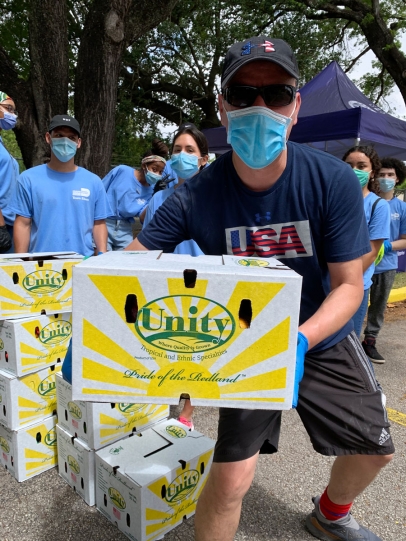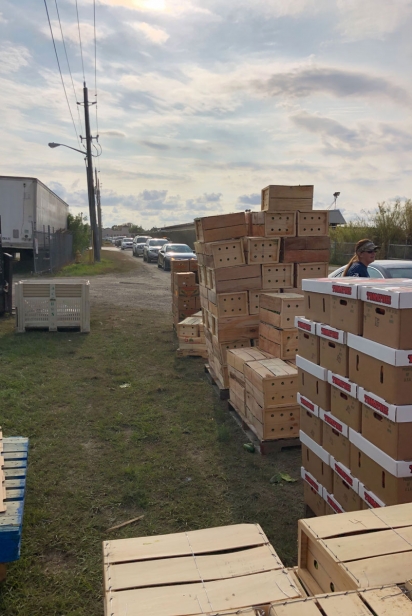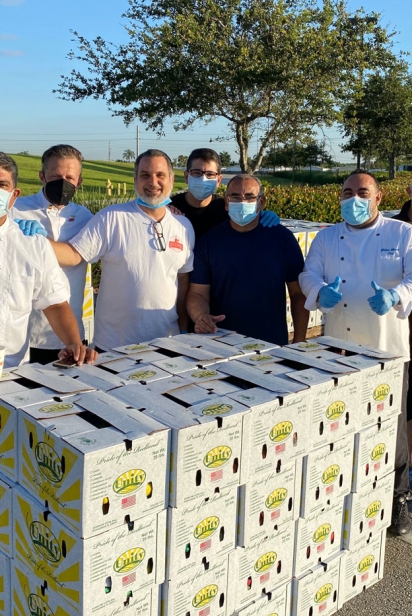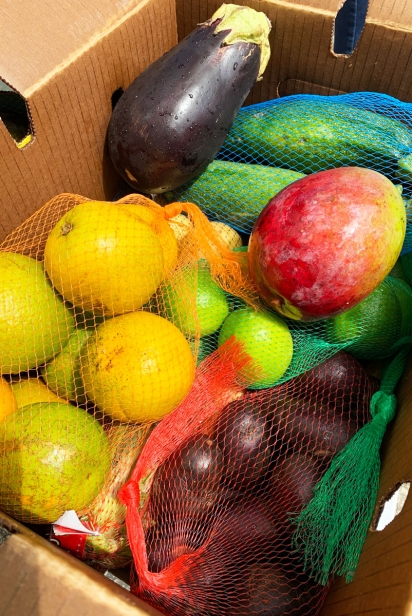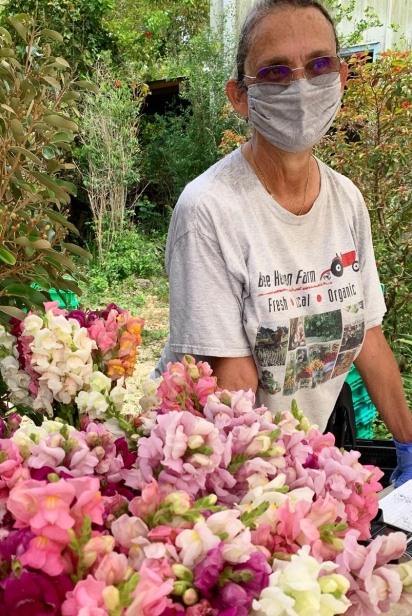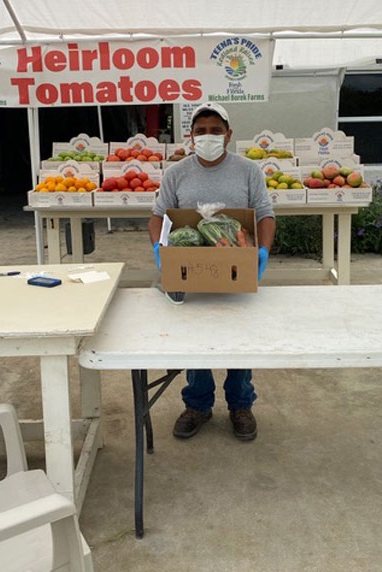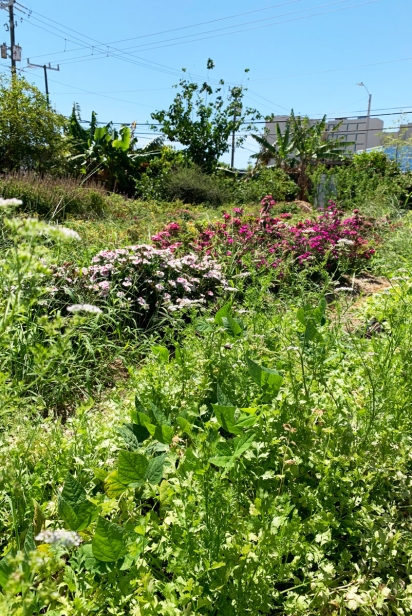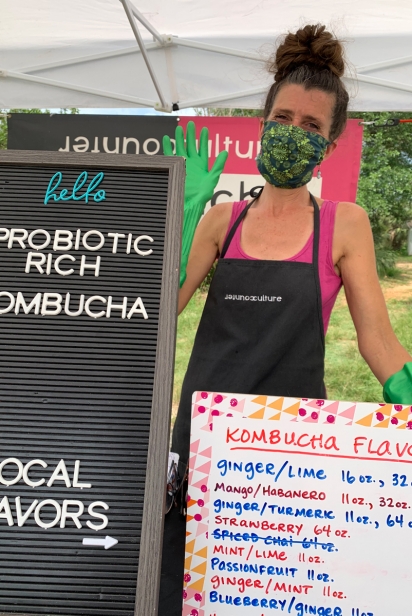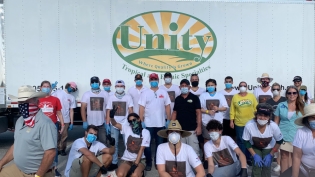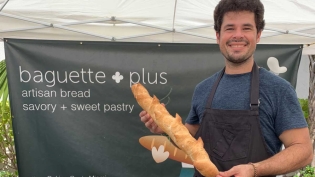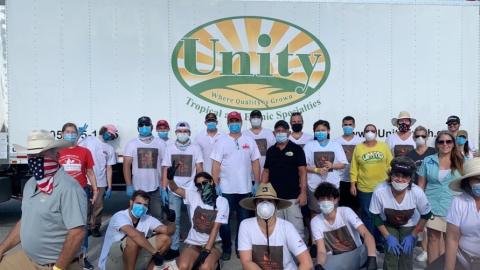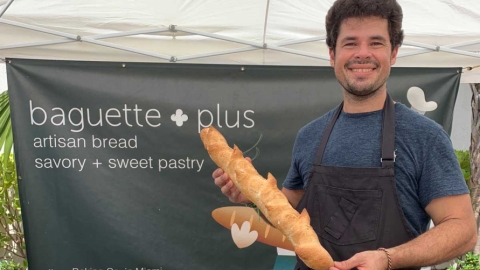Will the Pandemic Mark a Turning Point in Local Agriculture?
Mounds of yellow squash piled on the side of the road. Plowed-under tomato fields. Mountains of potatoes, free for the taking.
Two months ago, these images blanketed national newsfeeds. But in South Florida, many vegetables and fruits got out of the fields and onto plates across the state.
Consumer demand, and swift changes in supply-chain logistics to meet that demand, fueled that accomplishment. Suddenly wary of imported produce and supermarket experiences, shoppers started insisting on homegrown foods. If they were conveniently packaged in a box for drive-through pickup, even better.
Big South Florida farmers, reeling from the huge loss of business from foodservice and restaurants, were forced to transform business their model, selling directly to consumers instead of distributors. Small farmers, who typically sell what they grow at farmers markets and through community-supported agriculture (CSA) boxes, reacted to the sudden need by increasing ways to get their foods to customers through delivery systems and online ordering systems.
Here's a look at how the COVID-19 crisis has led to changes in South Florida local food system that may well outlive this pandemic, and create long-lasting benefits for local agriculture and consumers.
Adjusting to Change
For South Florida farmers, everything started in mid-March, when their big customers – restaurants, hotels, cruise lines – abruptly shut down. “Seventy percent of Florida tomatoes go to foodservice. Events weren’t happening,” says Charles LaPradd, Miami-Dade agricultural manager. “Foodservice, a huge part of the market, closed up.”
One of those big farmers hit hard was Sam S. Accursio, and Sons Farms, a third-generation business in the Redland in 1948. Gaining a reputation for selling cucumbers to major pickle companies like Vlasic, Heinz and Roddenberry, the farm expanded from five acres to 2,000 acres over the years, growing winter vegetables for wholesale clients.
At the beginning of the year, the height of the winter growing season, “prices were good,” says Sam Accursio. “The virus was just being talked about.” Coolers were packed with green beans, yellow squash and zucchini and cucumbers, ready to fill client orders.
“Then, on a Friday morning, there was no foodservice order,” Accursio says. They called Farm Share to start to give away some of the produce, but there was still plenty left over.
By 3am on Monday, he realized he had to do something with all those vegetables. He decided to sell it to folks in the neighborhood.
In the parking lot of their Homestead business, Accursio’s crews stacked crates of field-fresh veggies: Green beans, 28 pounds. Zucchini and yellow squash, 18 pounds. Okra, 15 pounds. Pickling cucumbers, 50 pounds. Each box sold for $10. They put the word out on social media.
As the sun rose, a parade of cars lined the street and workers started loading crates into trunks. By 10am, they were cleaned out. They restocked and repeated the sale over following days, even contacting other Florida farms looking to sell their produce. One of those was a blueberry farm in central Florida with thousands of flats of berries to sell. “We sold them at $20 a flat,” Accursio says. Customers were so grateful, “they were bringing me blueberry pies, cupcakes and cakes.”
The sales to the public lasted through May, the end of their growing season. While they're hoping to regain their wholesale business when their season starts again in the fall, Accursio says he’s looking to sell direct to consumers again, too.
“It opened my eyes the way local people were hungry for fresh, affordable produce,” he says. He also hopes Florida supermarkets carry more local seasonal produce rather than relying on cheaper imports. “Americans are demanding local food,” he says.
Giving Away and Giving Back
Much of the story about South Florida’s scramble to get freshly harvested produce into the hands of those in need revolves around one of logistics and ingenuity.
Some businesses are already set up to handle large quantities of food. Existing nonprofit organizations like Farm Share and Feeding South Florida take excess produce donated by farmers and distribute it to the needy. Even in a year without a disaster, the scope of their operations is massive. Last year, Farm Share handed out 20 million pounds of fresh fruits and vegetables to more than 17.5 million households throughout the state. Feeding South Florida distributed nearly 62 million pounds of food last fiscal year to over 706,000 individuals in food deserts, low-income neighborhoods that lack access to affordable and healthy food.
The state also mobilized to move produce where it was needed. Florida agricultural commissioner Nikki Fried set up Florida Farm to You, a marketplace page to connect farmers with consumers and businesses to buy Florida-grown fresh produce, seafood, poultry and honey, and access transportation services and refrigerated trucks. Through the Florida Department of Corrections' Farm-to-Inmate program, nearly 200 tons of locally grown squash, green beans, cucumbers and lettuce went directly to 87,000 inmates.
With so many people newly out of work, relief organizations had to devise different models to get them food. Some came up with food distribution plans to benefit both the farmers by paying them for their crops, and recipients who needed healthy food. Adopt-a-Box was one such arrangement. The collaborators were Redland Ahead, a nonprofit that helps veterans get into agriculture; Taste of Redland, a group of local growers and event planners promoting the locavore movement; and Unity Groves, longtime growers and packers. Funded by donations, Adopt-a-Box bought quality produce from farmers, packed it into 20-lb boxes and worked with Miami-Dade County and Miami-Dade Parks for sites to distribute the boxes using volunteer help.
To get started, Redland Ahead kicked in $10,000 kicked from its reserve fund, and asked for donations of $25 a box.
People started showing up at 4am for the first giveaway, held in Homestead, says John Mills of Redland Ahead. There were two lines of cars, with pallets of boxes ready to go. Recipients opened their trunks and volunteers loaded the boxes inside. “It was a safe event for everyone from volunteers to those picking up,” he says. That first day, 940 boxes were distributed. In the following weeks, the Saturday event moved around the county.
Mills described the plan as a win-win-win. “It was a trifecta,” he says, benefiting farmers, workers in the packing house, and out-of-work people in need of fresh produce.
Adopt-a-Box was such a success that Unity Groves used the model in its application for the USDA Farmers to Families program and received $1,875,000 to carry out the six-week federal program in South Florida. Farmers to Families buys fruits, vegetables and other local foods, then uses nonprofits to distribute the boxes, helping regional and local distributors whose workforce was significantly impacted by the closings of restaurants, hotels and other foodservice entities.
“It’s a great fit,” says Louis Carricarte of Unity Groves. This week’s box features sweet corn from Fort Myers; potatoes and cucumbers from elsewhere in Florida, and limes, zucchini, yellow squash, Indian and American eggplant, mango and mamey sapote from South Florida. Another bonus is adding tropical fruits to the boxes, exposing people to new flavors.
“It’s the first time people eat some of these foods,” he says. “Most people don’t realize what we grow down here. The freshness and taste is second to none.”
How Smaller Farmers Adapt
For Michael Borek of Teena’s Pride, known for heirloom tomatoes and pristine CSA boxes of vegetables and greens, the pandemic clobbered his small operation's direct sales to restaurants and big distributors. Early on, he found his cooler filled with eggplants and other freshly harvested vegetables with no place to go.
Borek got to work. He teamed up other small growers, like Harpke Family Farms in Dania Beach and Little River Cooperative, to sell his prized tomatoes for their own produce boxes. Teena's Pride opened up their farm on weekends for drive-though shopping. He converted his online shopping cart, originally set up for chefs (“they never did anything with it,” he says), so that consumers could order produce. He also sourced items like eggs, honey and tropical fruits to add to the shopping cart menu. Instead of winding down now until fall, Teena's Pride will stay open through the early summer, packing boxes with tropical fruits and working with other farms to give customers a produce box they can make meals out of.
As a result, Teena's Pride has seen an increase in CSA signups for now and for the upcoming season. “This farmers market has worked and kept air in our tires,” he says. “People seem happy with it.”
Once people find out how good fresh produce tastes, Borek is optimistic they'll stick with it for the future. “Mass-produced tomatoes are grown to fill boxes. Mine are grown for taste,” he says.
And he's hoping produce managers in grocery stores take notice of buyer enthusiasm and support local growers in season.
Ramping Up for Increased Demand
Longtime organic farmer Margie Pikarsky of Bee Heaven Farm was already starting her end-of-season trajectory when the shutdown began.
“Suddenly, everyone wanted fresh vegetables straight from the farm,” she says. Demand more than doubled overnight, so she hired more staff. Some of her CSA pickup sites had closed, so she had to find new locations. Restaurants like Chug’s in Coconut Grove and Babe’s Meat and Counter in Palmetto Bay bought her produce to sell to their customers. On Fridays, Pikarsky hosted a market at her Redland farm, letting in three cars at a time to shop for fresh vegetables, Counter Culture kombucha and plants. “At first, people had to wait in the street,” she says. “We got better with time.” Now, customers get a shopping list in their car, and they can buy mixed box of veggies and fruits for curbside pickup.
Pikarsky, who sells produce from her own organic farm and neighboring Redland farms as well as Worden Farm in Southwest Florida, has seen an increase in her CSA signups, including by former members who wanted to return to local food.
“My hope is that we get more truly regional distribution and more direct sales to the customer,” says Pikarsky. She’s optimistic that her summer customers will be more adventurous, trying tropical fruits like June plums, rose apple and caimito that will be added to her boxes, and will still be around in late fall, when more traditional crops are harvested. Her fear? “They’re going to forget.”
Online Ordering: “Let’s Go Bake More Lettuce”
Chris French of French Farms, who supplies vegetables to Little River Cooperative to sell at the Legion Park farmers market, saw the immediate demand for local produce when the market closed. “We made quick boxes with what we had – lots of salad and leaves, radishes, peppers, turmeric, tomatoes from Michael Borek, plus honey and seeds,” he says. They set up an online ordering system for customers to order for pickup.
New customers, accustomed to being able to order whatever they want 24/7 and get it delivered within a day or two, often don’t understand the new rules of online market buying. They can only order during a specific window and items quickly sell out. French explains: “We only make as much as we plant. It’s not like we can say, ‘Let’s go bake more lettuce.’”
The general public in South Florida has a lot of learning to do, he says. "We don’t have the variety they’re accustomed to.”
Despite that, French believes this may the best time to be a small farmer in South Florida. And the past few months of customer demand for local produce represent a unique opportunity.
“Could we take this enthusiasm and turn it into a local food system, a true farming co-op?” he asks. “A true CSA is a community coming together. We’re ripe for that.”


